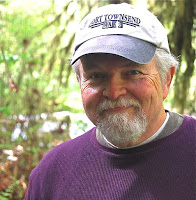An email from an Australian reader.
Okay, I had never heard of Grantchester, or of the vicar/detective Sydney Chambers. And I've still not read any of the books. But I'm very much enjoying the British series which I'm seeing on Amazon.
My reader said: "Hardy has a contemporaneous colleague ... an Anglican priest detecting in Cambridge (England). The series is written by James Runcie, son of the former Archbishop of Canterbury (so not so different to you) ..."
Set in the 1950s
He's right. My Hardy character is very loosely based on my own father, an Episcopal (Anglican) priest who served in Alaska at Nenana and later in Sitka, starting in 1955.
I had long wanted to write a mystery but couldn't find a character who hadn't already been written. Until Hardy.
Alaska was remote in the 1950s, not a state, not a lot of law enforcement, not much communication. At the same time, just down the road from Nenana, the government was building a huge RADAR installation, to track incoming Russian bombers. Of course, who ever heard of a project like that one that didn't come with hot and cold running spies! At least in my mind.
It's also worth mentioning, that I was attracted to a character with moral code in place. We all know what he believe from page one, and we expect to watch him be true to those beliefs. Being true to himself is part of the attraction to any of the great mystery characters.
Did you know there are said to be more than 300 clergy detectives in fiction!
"Will it make me blush?"
Recently at a book show, a reader picked up the first Father Hardy, "Indecent Exposure," and asked if it would make her blush. I told her I didn't think so. In Alaska, the natural result of being indecently exposed isn't blushing, it's freezing! She bought the book.
If you like Grantchester, I'm pretty sure you'll like Father Hardy
Here's one more quote from my reader: "These are real ripping, roller coaster yarns ... The action never flags: there are murders aplenty to solve, conspiracies to unmask, near-death experiences to survive, moose meat to eat, love interests to follow and a psychopath around every corner."
Sounds pretty heavenly, for mystery readers.
Available on Amazon in paperback or ebook, Smashwords (in any e-format), or order from your favorite bookstore. And I'm always most grateful for your posted review.

